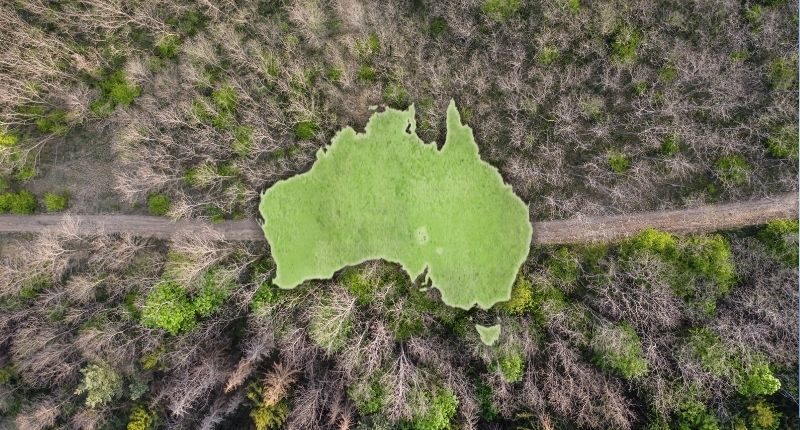- Less than 1% of buyers actively use sustainablity keywords
- Green homes attract an over $100K price premium
- Sustainable homes spend 3.8% less days on market than non-energy-efficient homes
New research from Domain (ASX: DHG) has revealed some curious results: less than 1% of house hunters actively use green search words.
That’s despite CRC for Low Carbon Living data, showing two-thirds of home buyers having a preference for energy-efficient homes when given a choice.
The throw away line: when given a choice.
While it could be picked up from the zeitgeist, Domain data has confirmed why green homes are paradoxically taking a hit and highly prized.
The company said search behaviour for keywords including, but not limited to, rainwater tanks, solar panel, north facing, conservation, energy, orientation, shade, cross ventilation, insulation and zoning were on the rise between 2019 and 2020, but experienced a fall in 2021.
The likely reason is simple: Affordability. We already know the cost of living is becoming uncomfortable for many, but the premium for a sustainable home may just break some people’s banks.
Domain data said energy-efficient houses can expect to see a premium of $125,000, with energy-efficient units calling for a $72,750 premium in 2022 – and that’s regardless of location too.
The price premium of energy-efficient homes compared to non-energy efficient homes, Australia.

There are two sides to the coin of course, the other being that people are willing to pay a premium for a more energy-efficient property. Domain said it may be due to understanding the sustainability benefits, greater liability and reduced utility bills down the track.
Sustainable homes also sell faster, Domain said green properties spend 3.8% less days on market than non-energy-efficient properties.
But I am going green!
Here’s the other half of that paradoxical going green but not: Sustainable homes are getting more eyes on listings. While few buyers began their search looking for sustainability features, sustainable homes are seeing an average of 8.7% more listing views for houses and 5.5% more views for units in 2022.
The data also showed sustainable features are making their way onto more listings, with more than half of all for sale listings in Australia containing energy-efficient keywords.
Australian sellers are increasing the use of energy-efficient keywords, such as solar panel, eco homes and insulation, in property listings across both houses and units.
The proportion of sellers using energy-efficient keywords in listings, Australia

The report also noted that significantly more homes had energy efficient keywords compared to units, with a likely reason being sustainable features are more easily added to houses than units, for example solar panels.
This is a consistent trend across all states, however the NT, SA and the ACT are leading the way with 70% of sale listings containing energy-efficient keywords, which could reflect local market habits and the diverse climates across our states.
Another aspect impacting the supply of green homes is the amount of older unit stock transacted that could be impacting the overall proportion of energy-efficient keywords.
With the redevelopment of older sites and the rise of new, more sustainably built developments, this should vastly improve this outcome.
So what’s the deal?
Domain’s Chief of Economics and Research, Dr Nicola Powell said, “The pandemic has been a catalyst for sharpened focus in the way we look at the world and the way we live.
“Sustainability issues have gained greater importance, with a staggering 90% of Australians engaged to some extent on the topic1, and more recently climate change polling as a major issue during the federal election campaign, with 8 out of 10 Australians wanting greater climate action from the government2. Living in an energy-efficient home is an essential part of tackling climate change, while helping households manage living expenses and rising energy bills.”
While sustainability is certainly something everyone is conscious of, Domain data showed granny flats, courtyards, and pools ranked higher in importance for property buyers.
“Sustainable features for many are a nice-to-have rather than a must-have when beginning a property search. This doesn’t mean buyers are not wanting more energy-efficient elements for their homes, particularly given research proves we have seen a conscious societal steer towards environmentally friendly outcomes,” said Dr Powell.
“We believe it is due to a general lack of understanding of the short- and long-term benefits of sustainable features, market dynamics influencing search criteria and the compromises buyers are willing to make depending on the property cycle stage.”
The crux seems simple: buyers are hamstrung between what they aspire to, and what they can afford, but the hope is that the situation will change.
Dr Powell said: “An approach to encourage and make sustainable homes attainable for all budgets is essential for improving the carbon footprint of our homes and reducing household bills, whether that’s through the form of incentives for developers or homeowners to provide greener living.
“Once all homes have an expected minimum standard of inclusions, we hope to see less of an impact on price.”
~~
1 EY Future Consumer Index.
2 Ipsos. https://www.ipsos.com/en-au/8-10-australians-are-concerned-about-climate-change.








